Actress Gugu Mbatha-Raw Shines a Light on the Refugee Crisis in the Democratic Republic of the Congo (Exclusive)
The 'Lift' star and Goodwill Ambassador for UNHCR, the UN Refugee Agency penned a personal essay on a cause close to her heart
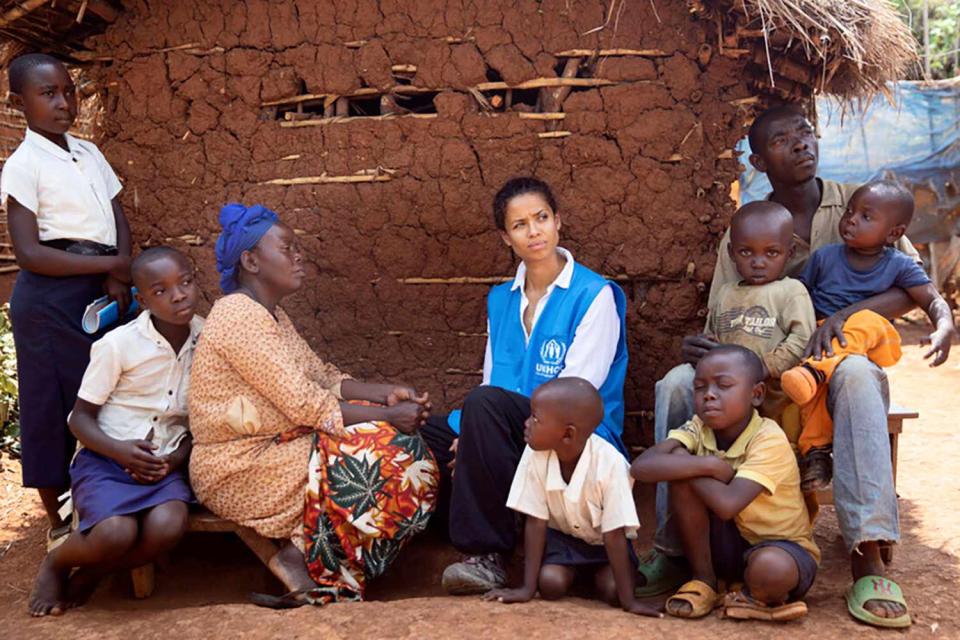
UNHCR/Caroline Irby
UNHCR Goodwill Ambassador Gugu Mbatha-Raw visits the home of Vicky and her family, who live in a resettlement site in Kalehe and have just received a distribution of NFIs (non-food items) from UNHCR.Eighteen months since my journey to the Democratic Republic of the Congo (DRC), a disturbing truth lingers — despite a worsening situation, this humanitarian crisis remains conspicuously absent from the headlines.
I reflect on some of the incredible individuals I had the pleasure of meeting — Vicky, Veronique, Cadette and Amelie. Their faces, stories and surroundings replay in my mind.
Has Cadette had her baby? How is Vicky's son? Has Veronique turned her shelter into a home?
As a Goodwill Ambassador for UNHCR, the UN Refugee Agency, I was privileged to be welcomed into their lives in a country entangled in one of the world's most complex humanitarian crises and holding the largest internally displaced population in Africa.
While there, I bore witness to the unthinkable challenges these women and their families faced as a result of being forced to the flee violence. Leaving their homes with few or no belongings, exposed to the elements and vulnerable to human rights violations. Their narratives painted an emotional picture, making it impossible to conceive that their situations could deteriorate further.
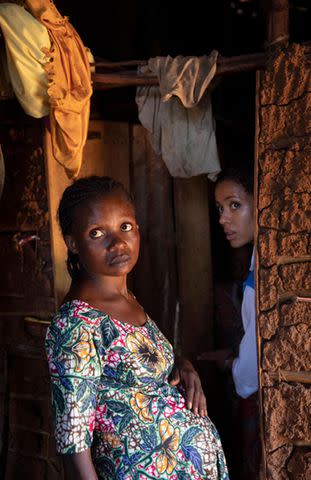
UNHCR/Caroline Irby
UNHCR Goodwill Ambassador Gugu Mbatha-Raw with Maliyetu Shamavu, known as Cadette, 25, pregnant with her seventh child, at home in a transitional settlement site.Just in recent months, more than 398,000 people have been forced to flee a dramatic resurgence of the conflict in North Kivu Province, joining millions of innocent civilians who have already found themselves trapped in dire and deteriorating humanitarian circumstances. This, in a year of natural disaster which has known the worst levels of flooding of the Congo river since 1961.
Related: Bezos Earth Fund Teams Up with the Jane Goodall Institute — and Provides $5M Grant (Exclusive)
Vicky's face reappears in my thoughts. The formidable challenges she already faced in a resettlement site in Kalehe, South Kivu Province, where making ends meet was a daily struggle, forcing agonizing choices about which child could go to school.
The prospect of Vicky and her family being uprooted again or, worse yet, harmed, deeply saddens me. I think of her children, and of this young generation who have known only disaster and displacement.
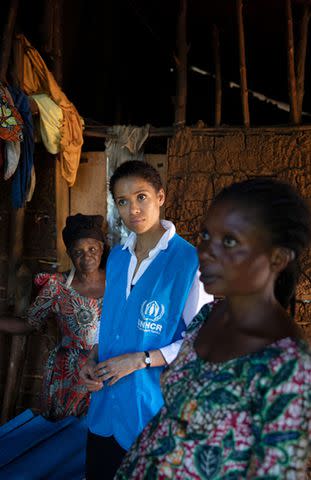
UNHCR/Caroline Irby
UNHCR Goodwill Ambassador Gugu Mbatha-Raw with Maliyetu Shamavu, known as Cadette, 25, pregnant with her seventh child, at home in a transitional settlement site.Reports of killings, kidnappings and the burning of homes also flood the news, and again, the faces of those I encountered flash before my eyes. The significance of a safe home to those who are displaced is colossal. Many of the women I met had been victims of sexual and gender-based violence during previous conflicts, and their new homes symbolized safety, security and a space to heal.
I recall teenage Amelie, who shared with me her ordeal of gender-based violence and the daughter she now struggles to raise as a consequence. She has carried this unsought role of motherhood with strength and resolve, but I think of her many sisters in DRC who are embarking on a similar journey, in all its psychological and emotional complexity, and my heart breaks.
In addition to 7.2 million Congolese citizens displaced by conflict and natural disaster, there are more than half a million refugees who fled insecurity in Central African Republic, South Sudan and other countries. As the violence in North Kivu Province again reaches fever-pitch, there is a growing concern that tens of thousands of people are facing the harrowing prospect of displacement for a second time.
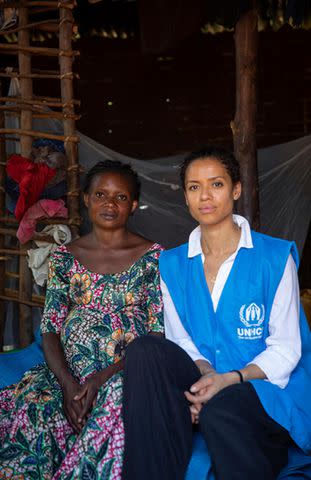
UNHCR/Caroline Irby
UNHCR Goodwill Ambassador Gugu Mbatha-Raw with Cadette, 25, pregnant with her seventh child, in her home in a resettlement site in Kalehe.Forced to flee their homes once is tragic, but twice is devastating.
I think of how desperately hard this would be for Cadette, whose situation when I met her was already challenging. Cadette lived in a small house with two rooms, with her six children (and at the time, was pregnant with her seventh), her husband, grandmother and her seven siblings, who she also looks after. She confronted impossible choices on a daily basis, like sourcing food for her family or fixing the walls of her home which leaked in the rain.
I think of her new baby’s future. The ongoing conflicts, or worse, their escalation, would cast a very dark shadow over the child's upbringing, painting a bleak picture of uncertainty.
However, some reassurance can be found in UNHCR and other humanitarian organizations working on the ground. In collaboration with local authorities, UNHCR and partners plan to deliver shelter assistance to over 911,000 displaced people in 2024, nearly double that of last year. Additionally, they are implementing programs to address the urgent needs of displaced people, including access to education, healthcare and livelihoods opportunities to mitigate the impact of prolonged displacement.
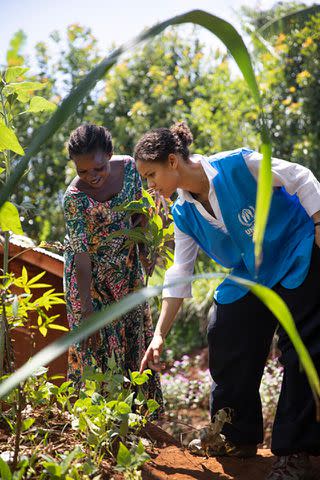
UNHCR/Caroline Irby
UNHCR Goodwill Ambassador Gugu Mbatha-Raw with Cadette in the plot of land where she grows vegetables by her home in a resettlement site in Kalehe.UNHCR and its partners are actively addressing immediate needs, but this sustained effort demands greater support. As the situation continues to unfold, additional assistance is essential to ensure that families like Cadette's can rebuild their lives in an environment of stability and hope.
The stark juxtaposition of worsening conditions and media silence compels reflection on the unseen struggles of these brave and resilient faces.
As their untold stories echo, we confront the question: How can we turn away?
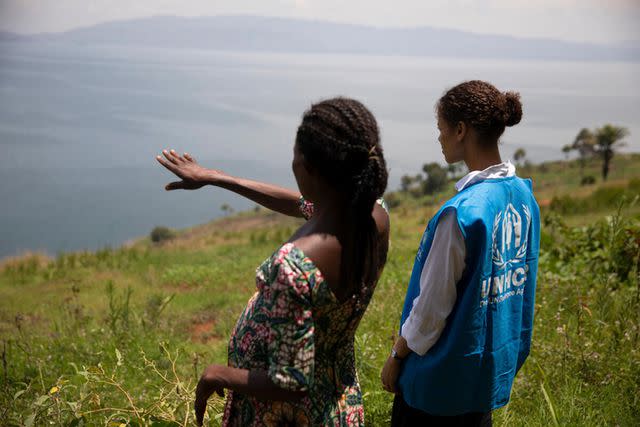
UNHCR/Caroline Irby
For more People news, make sure to sign up for our newsletter!
Read the original article on People.


